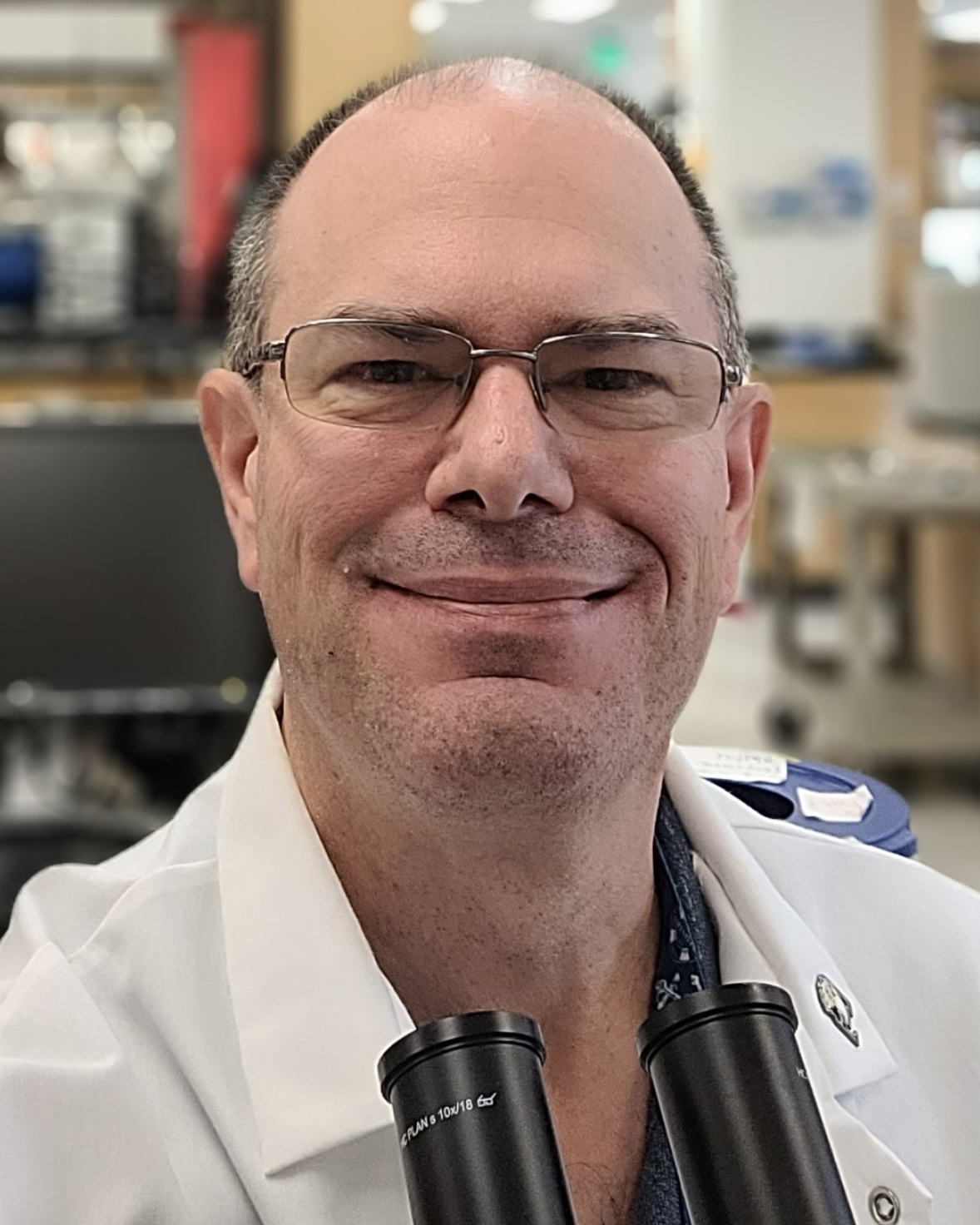Michael Angell

Education
- BA, Biology, Western Maryland College, 1987
- Ph.D., Microbiology and Immunology, Pennsylvania State University, Milton S. Hershey Medical Center, 1993
- Post-doc Training, University of Michigan, Institute of Gerontology, 1993–1996
Interests and Expertise
My laboratory is interested in investigating virus-host interactions in eukaryotic and prokaryotic models. Past projects have focused on the vertebrate pathogens, Cottontail Rabbit Papillomavirus and Mouse Adenovirus. Both serve as model systems for human infections with Human Papillomaviruses and Human Adenoviruses. My work in the former model in the Kreider Lab at Pennsylvania State University led to a patent for monitoring papillomavirus replication in cell culture. Since 2017, my lab has changed focus to investigate the replication of bacterial viruses (bacteriophage) in cyanobacteria (blue-green algae). To be specific, we are investigating the infection of the cyanobacteria species Microcystis aeruginosa with the myovirus family, Ma-LMM01. Cyanobacteria of the genus Microcystis are responsible for toxin-producing nuisance blooms in freshwater lakes, including the Great Lakes. Using Ford Lake as our model system, we have detected the presence of this phage group and are assessing its impact on endogenous Microcystis strains in the lake. Understanding viral infection within these cells will help us understand the role of viruses in the regulation of algal blooms as well as the regulation of environmental nutrients.
Courses
- BIO256 Biology of Cancer
- BIO 320 - General Microbiology
- BIO 321 - General Microbiology Lab
- BIO328 Introductory Microbiology
- BIO426/526 Immunobiology
- BIO428/528 General Virology
- BIO544 Tissue Culture Techniques and Methods
Publications and Presentations
Mohamed OG, Dorandish S, Lindow R, Steltz M, Shoukat I, Shoukat M, Chehade H, Baghdadi S, McAlister-Raeburn M, Kamal A, Abebe D, Ali K, Ivy C, Antonova M, Schultz P, Angell M, Clemans D, Friebe T, Sherman D, Casper AM, Price PA, Tripathi A. Identification of a New Antimicrobial, Desertomycin H, Utilizing a Modified Crowded Plate Technique. Mar Drugs. 2021 Jul 27;19(8):424. doi: 10.3390/md19080424. PMID: 34436264; PMCID: PMC8400312.
Hopfl, R., Christensen, N.D., Angell, M.G., Kreider, J.W. 1995. Leukocyte proliferation in vitro against cottontail rabbit papillomavirus in rabbits with persisting papillomas/cancer or after regression. Arch Dermatol Res. 287: 652–658.
Gangemi, J.D., Pifisi, L., Angell, M., Kreider, J.W. 1994. HPV replication in experimental models: Effects of interferon. Antiviral Res. 24: 175–190.
Hopfl, R.M., Christensen, N.D., Angell, M.G., Kreider, J.W. 1993. Skin test to assess immunity against cottontail rabbit papillomavirus antigens in rabbits with progressing papillomas or after papilloma regression. J. Invest. Dermatol. 101:227–231.Okabayashi, M, Angell, M.G., Budgeon, L.R., Kreider, J.W. 1993. Shope papilloma cell and leukocyte proliferation in regressing and progressing lesions. Am. J. Pathol. 142: 489–496.
Angell, M.G., Christensen, N.D., Kreider, J.W. 1992. An in vitro system for studying the initial stages of cottontail rabbit papillomavirus (CRPV) infection. J. Virol. Methods 39: 207–216.

